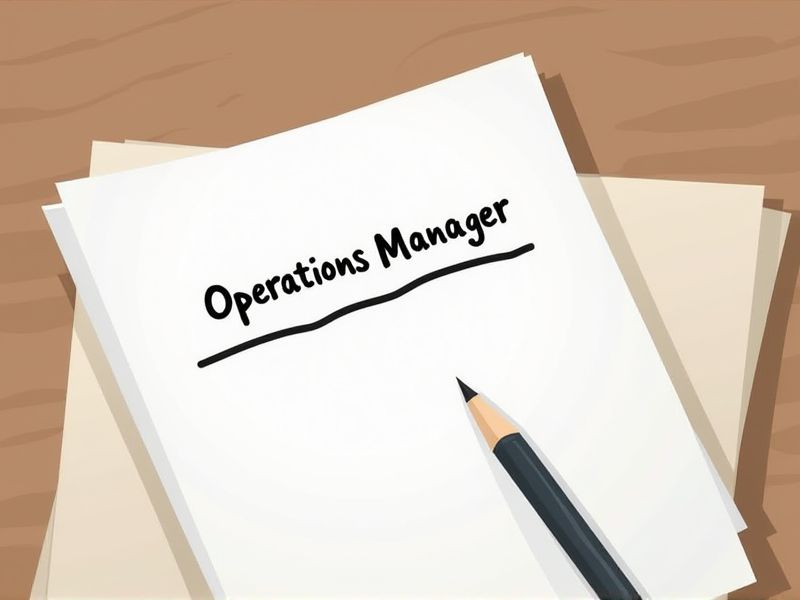
A Utility Operations Manager oversees critical infrastructure and ensures seamless delivery of essential services. Certification in this field validates their expertise and competency in managing complex systems. It also fosters industry trust and adherence to regulatory standards. Here are some important certifications that you may need as a Utility Operations Manager.
Certified Energy Manager (CEM)
Certified Energy Managers possess specialized knowledge in energy efficiency, enabling Utility Operations Managers to optimize energy use and reduce costs. Incorporating a CEM ensures compliance with regulatory standards, minimizing the risk of penalties and legal issues. Data-driven insights provided by a CEM can enhance decision-making and improve operational efficiency. A CEM's expertise supports the development of sustainable practices, aligning operations with environmental goals.
Project Management Professional (PMP)
A Project Management Professional (PMP) certification equips a Utility Operations Manager with standardized project management skills, improving efficiency in operations. Enhanced project management capabilities lead to better resource allocation, directly affecting operational productivity. PMP certification is recognized globally, offering the manager a framework to navigate complex utility projects while maintaining compliance with industry regulations. Structured methodologies from PMP ensure timely project delivery, reducing costs and mitigating risks associated with operational interruptions.
Six Sigma Black Belt Certification
Achieving a Six Sigma Black Belt Certification equips a Utility Operations Manager with advanced problem-solving skills, improving process efficiency and reducing waste within operations. By mastering data-driven decision-making, the manager enhances quality control measures and minimizes error rates across utility services. The certification encourages a culture of continuous improvement, fostering innovation and strategic thinking among teams. This leads to cost savings and increased customer satisfaction, strengthening the utility's competitive position in the industry.
OSHA 30-Hour Safety Certification
OSHA 30-Hour Safety Certification equips a Utility Operations Manager with comprehensive knowledge about workplace safety regulations, reducing the likelihood of accidents. A well-versed manager is better positioned to implement effective safety protocols, enhancing worker protection and compliance. Understanding OSHA guidelines can lead to a decrease in workplace violations, minimizing financial and legal liabilities. Safety certification fosters a culture of safety within the team, improving overall operational efficiency and morale.
Certified Facility Manager (CFM)
Having a Certified Facility Manager (CFM) ensures that a Utility Operations Manager possesses a comprehensive understanding of facility management principles. This certification validates expertise in critical areas such as operations, maintenance, and project management, which are crucial for managing utility facilities effectively. A CFM status increases the manager's ability to implement sustainable practices and adhere to regulatory standards. Maintaining a CFM can lead to improved risk management and cost efficiency in utility operations.
Certified Reliability Engineer (CRE)
In utility operations, a Certified Reliability Engineer (CRE) enhances system reliability through structured methodologies, directly reducing downtime and maintenance costs. CREs apply data-driven decision-making, leading to optimized resource allocation and improved asset management. Their expertise in risk management minimizes operational disruptions, ensuring consistent service delivery. With focus on quality and reliability, a CRE helps achieve regulatory compliance, safeguarding both operational and reputational integrity.
Confined Space Entry Certification
Confined Space Entry Certification is crucial for a Utility Operations Manager to ensure compliance with safety regulations, minimizing liability and potential fines. Proper certification equips managers with the knowledge to identify potential hazards, decreasing the risk of accidents and ensuring worker safety. Understanding confined space protocols allows managers to effectively coordinate and implement emergency response plans, reducing the impact of unforeseen incidents. Certification fosters a culture of safety and professionalism, enhancing team efficiency and operational success.
ISO 50001 Energy Management Systems Lead Auditor Certification
ISO 50001 Energy Management Systems Lead Auditor Certification equips a Utility Operations Manager with the skills to systematically improve energy performance, resulting in reduced operational costs. Understanding the certification provides a framework for optimizing energy use, which can lead to enhanced sustainability and compliance with legal requirements. Possessing this certification enables the manager to lead audits effectively, ensuring that energy management strategies are both efficient and consistent. Adoption of the ISO 50001 standard typically results in improved organizational reputation by demonstrating a commitment to environmental responsibility.
ISO 14001 Environmental Management System Lead Auditor Certification
Achieving ISO 14001 Environmental Management System Lead Auditor Certification ensures a Utility Operations Manager can adeptly identify and mitigate environmental risks tied to utility operations. This expertise aids in maintaining compliance with environmental regulations, which reduces legal liabilities and associated costs. Certification enhances the manager's ability to implement sustainable practices, ultimately supporting corporate social responsibility goals. It also equips the manager with the skills necessary to lead audits and foster continuous improvement in environmental performance.
Certified Plant Maintenance Manager (CPMM)
A Certified Plant Maintenance Manager (CPMM) enhances the efficiency of utility operations by ensuring that all maintenance activities are executed using best industry practices. Improved maintenance reliability from CPMM reduces operational downtime, leading to cost savings. Their expertise helps in implementing effective preventive maintenance strategies, which extends the lifespan of utility equipment. CPMM certification signals a commitment to safety standards, minimizing risks associated with equipment failures.
Summary
By obtaining certifications, you will likely enhance your operational and leadership skills as a Utility Operations Manager. This often leads to streamlined processes and increased efficiency within your team. Certified managers tend to report improved decision-making capabilities, which can result in reduced operational costs. Furthermore, earning certifications may open doors to career advancement opportunities and increased professional credibility.
